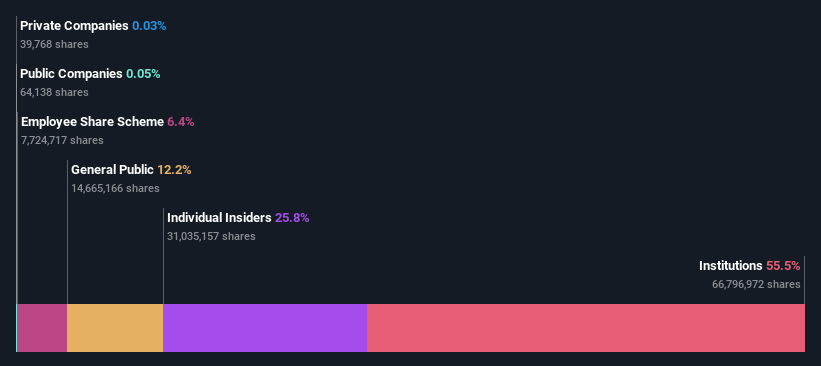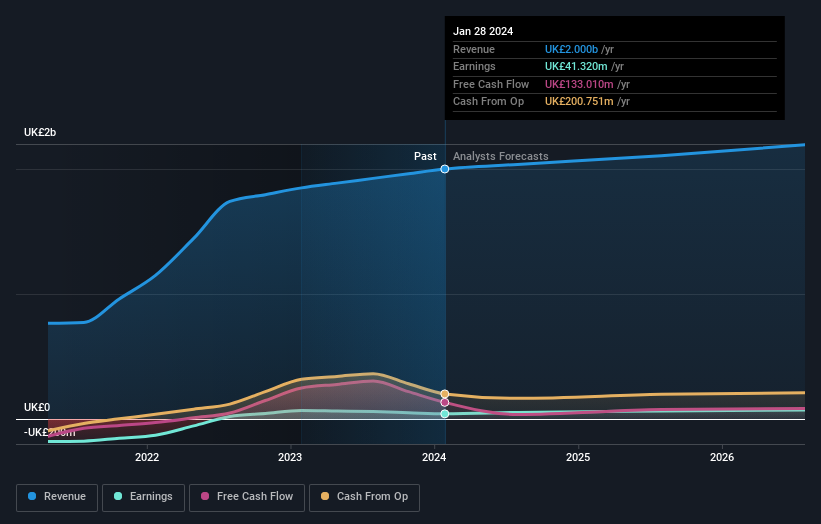- United Kingdom
- /
- Hospitality
- /
- LSE:JDW
J D Wetherspoon plc's (LON:JDW) market cap decline of UK£48m may not have as much of an impact on institutional owners after a year of 5.4% returns

Key Insights
- Institutions' substantial holdings in J D Wetherspoon implies that they have significant influence over the company's share price
- The top 6 shareholders own 51% of the company
- Recent sales by insiders
Every investor in J D Wetherspoon plc (LON:JDW) should be aware of the most powerful shareholder groups. The group holding the most number of shares in the company, around 56% to be precise, is institutions. That is, the group stands to benefit the most if the stock rises (or lose the most if there is a downturn).
No shareholder likes losing money on their investments, especially institutional investors who saw their holdings drop 5.2% in value last week. Still, the 5.4% one-year gains may have helped mitigate their overall losses. We would assume however, that they would be on the lookout for weakness in the future.
In the chart below, we zoom in on the different ownership groups of J D Wetherspoon.
View our latest analysis for J D Wetherspoon

What Does The Institutional Ownership Tell Us About J D Wetherspoon?
Institutional investors commonly compare their own returns to the returns of a commonly followed index. So they generally do consider buying larger companies that are included in the relevant benchmark index.
As you can see, institutional investors have a fair amount of stake in J D Wetherspoon. This suggests some credibility amongst professional investors. But we can't rely on that fact alone since institutions make bad investments sometimes, just like everyone does. It is not uncommon to see a big share price drop if two large institutional investors try to sell out of a stock at the same time. So it is worth checking the past earnings trajectory of J D Wetherspoon, (below). Of course, keep in mind that there are other factors to consider, too.

Investors should note that institutions actually own more than half the company, so they can collectively wield significant power. We note that hedge funds don't have a meaningful investment in J D Wetherspoon. Because actions speak louder than words, we consider it a good sign when insiders own a significant stake in a company. In J D Wetherspoon's case, its Top Key Executive, Timothy Martin, is the largest shareholder, holding 25% of shares outstanding. In comparison, the second and third largest shareholders hold about 6.9% and 6.4% of the stock.
On further inspection, we found that more than half the company's shares are owned by the top 6 shareholders, suggesting that the interests of the larger shareholders are balanced out to an extent by the smaller ones.
While it makes sense to study institutional ownership data for a company, it also makes sense to study analyst sentiments to know which way the wind is blowing. There are plenty of analysts covering the stock, so it might be worth seeing what they are forecasting, too.
Insider Ownership Of J D Wetherspoon
While the precise definition of an insider can be subjective, almost everyone considers board members to be insiders. Management ultimately answers to the board. However, it is not uncommon for managers to be executive board members, especially if they are a founder or the CEO.
I generally consider insider ownership to be a good thing. However, on some occasions it makes it more difficult for other shareholders to hold the board accountable for decisions.
Our information suggests that insiders maintain a significant holding in J D Wetherspoon plc. It is very interesting to see that insiders have a meaningful UK£227m stake in this UK£878m business. Most would be pleased to see the board is investing alongside them. You may wish to access this free chart showing recent trading by insiders.
General Public Ownership
The general public-- including retail investors -- own 12% stake in the company, and hence can't easily be ignored. This size of ownership, while considerable, may not be enough to change company policy if the decision is not in sync with other large shareholders.
Next Steps:
It's always worth thinking about the different groups who own shares in a company. But to understand J D Wetherspoon better, we need to consider many other factors. Take risks for example - J D Wetherspoon has 3 warning signs (and 1 which shouldn't be ignored) we think you should know about.
If you would prefer discover what analysts are predicting in terms of future growth, do not miss this free report on analyst forecasts.
NB: Figures in this article are calculated using data from the last twelve months, which refer to the 12-month period ending on the last date of the month the financial statement is dated. This may not be consistent with full year annual report figures.
New: Manage All Your Stock Portfolios in One Place
We've created the ultimate portfolio companion for stock investors, and it's free.
• Connect an unlimited number of Portfolios and see your total in one currency
• Be alerted to new Warning Signs or Risks via email or mobile
• Track the Fair Value of your stocks
Have feedback on this article? Concerned about the content? Get in touch with us directly. Alternatively, email editorial-team (at) simplywallst.com.
This article by Simply Wall St is general in nature. We provide commentary based on historical data and analyst forecasts only using an unbiased methodology and our articles are not intended to be financial advice. It does not constitute a recommendation to buy or sell any stock, and does not take account of your objectives, or your financial situation. We aim to bring you long-term focused analysis driven by fundamental data. Note that our analysis may not factor in the latest price-sensitive company announcements or qualitative material. Simply Wall St has no position in any stocks mentioned.
Have feedback on this article? Concerned about the content? Get in touch with us directly. Alternatively, email editorial-team@simplywallst.com
About LSE:JDW
J D Wetherspoon
Owns and operates pubs and hotels in the United Kingdom and the Republic of Ireland.
Undervalued with solid track record.
Similar Companies
Market Insights
Community Narratives





